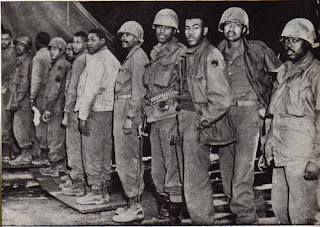 |
| First Liuetenant Vernon J. Baker |
 |
| Isaiah Bradley |
In
2003 Marvel Comics called Truth: Red,
White, and Black which went into America’s Super Soldier project to create
more Captain America. Variations of the project and related attempts of
repeating it resulted in other heroes such as Wolverine and Luke Cage but this
particular project—which mimicked the Tuskegee Experiments—resulted in Isaiah
Bradley being its sole success.
To the Black heroes in Marvel he is known as
the “Black Captain America.” So
in honor of this time of punching Nazis and Black History Month, let’s look at
one real life Black Captain America from World War II in First Lt. Vernon J.
Baker.
Origins
 |
| Soldiers of the 92nd Infantry |
Born
December 17, 1919 in Cheyenne, Wyoming, Baker’s childhood was spent living with
his grandparents after the death of his parents when he was four. As an adult,
he followed his grandfather into working for the railroad as a porter, until
his passing in 1939.
Following
a few jobs, he would attempt to enlist in the Army but was turned away. He
would return in the spring of 1941 and have better luck. Originally, he wanted
to be a quartermaster but ended up in infantry. Baker would begin his training
that summer at Camp Wolters.
After
shipping off to Italy in the summer of 1944 with the all-Black 92nd Infantry
also known as the Buffalo Soldiers, Baker was wounded in combat. He would rejoin
the 92nd which was in on standby in Italy.
Fortified
Zone
It
would be in April 1945 that Lt. Baker was activated and would lead a platoon of
25 in taking the Nazi-held fortress of Castle Aghinolfi. The advantage the Nazis
held included a very high position in the Appenine Mountains with a view of two
roads that led to the castle and ran through the treacherous Gothic Line.
 |
| Castle Aghinolfi |
The
Gothic Line featured some 2,000 heavily fortified machine gun nest, mines,
bunkers, barbed wire, and posts. So Lt. Baker and his platoon would have to
make their way through this absolute meat grinder and scale the mountain that Castle Aghinolfi sat on. The regiment
had tried several times to take the castle, with no success.
 Lt.
Baker’s first attempt at a front assault saw him lose a number of his team. He
would try again this time using a measured approach that saw the platoon stay
out of the enemy’s sight and sneak through defenses.
Lt.
Baker’s first attempt at a front assault saw him lose a number of his team. He
would try again this time using a measured approach that saw the platoon stay
out of the enemy’s sight and sneak through defenses.
Baker
managed to get what was left of his platoon in place and got back to the
commanding officer over his platoon one Captain John Runyon who followed Baker
and company and didn’t lead the men to this point in the mission. While getting
orders from Runyon a German soldier tossed a potato masher explosive. This prompted Captain Runyon to get out of the way, alerting Lt. Baker who would take the fleeing Nazi soldier.
With things somewhat under control—or as under control as things could
get in this case—Baker would scout for hostiles.
Demolition
Man
In
scouting along the he would come across several defensive points held by the
Nazis…and blow up their spot. By the time he was done Lt. Baker had blown up six
machine gun nests, four dugouts and two posts with a combination of grenades
and machine gun fire.
He
would return to his platoon but his actions had alerted enemies in Castle
Aghinolfi and now the Buffalo Soldiers were in a…
Bullet
Hell
Fire
rained down on the 92nd Infantry who were pretty much sitting ducks considering
their location. By fire we’re talking mortars, bullets—everything.
 Lt.
Baker would find Captain Runyon hiding in a house near the foot of the castle
as all the commotion went on outside. After telling Baker to get his men
together, he said that he would head back for reinforcements to assist in
taking the castle.
Lt.
Baker would find Captain Runyon hiding in a house near the foot of the castle
as all the commotion went on outside. After telling Baker to get his men
together, he said that he would head back for reinforcements to assist in
taking the castle.
…as
you may have guessed, that shit didn’t happen and he simply bounced. Not only
did Runyon bounce, he said that the platoon had been wiped out. Of course, that
doesn’t stop some accounts of Captain Runyon from painting him
favorably.
Baker
continued with the attempt to take Castle Aghinolfi and called for
reinforcements in the form of bombs on specific weapons locations. When that
failed he decided to hold the Nazis off for hours, knowing that backup was
coming. With platoon down to six of the original 25, he decided to retreat—but
things weren’t going to be so easy with the enemy knowing exactly where they
were and having the best position.
He
managed to draw the enemy’s fire by yelling and opening fire on them as his men
retreated. When he eventually returned to the Allied front he had been shot a
few times, but managed to lead a battalion soldiers the next night, this time taking the Aghinolfi the following day.
It should be noted that this particular feat is the first time Black soldier
led a white battalion.
Epilogue
 Second
Lieutenant Vernon Baker would spend the end of World War II in Rome as an
occupying force until 1947. He wouldn’t get his commission because he didn’t
have a college education and would be called back up in the 1950s for the
Korean War as part of the 11th Airborne. He would retire from the military in
1968 at the rank of First Lieutenant.
Second
Lieutenant Vernon Baker would spend the end of World War II in Rome as an
occupying force until 1947. He wouldn’t get his commission because he didn’t
have a college education and would be called back up in the 1950s for the
Korean War as part of the 11th Airborne. He would retire from the military in
1968 at the rank of First Lieutenant.
While
he had been awarded several honors for his service—including the Purple Heart
twice, the Bronze Star Medal, and the Distinguished Service Cross among
others—he wasn’t awarded the Medal of Honor initially. It wasn’t until a study
in 1993 found that Black soldier were often passed over for the Medal of Honor
and there was an effort to go back and correct it.
M. Swift is a long time wrestling fanatic. When he's not writing about wrestling history and other stuff he is often writing short sci-fi stories, listening to heavy metal, and playing RPGs. Follow @metalswift



